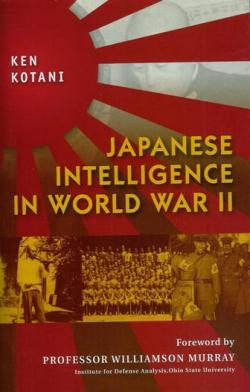Japanese Intelligence in World War II

By Ken Kotani (小谷 賢), translated by Chiharu Kotani, Osprey, 2009,
224 pages including end notes, bibliography and index,
ISBN 13-978-1-84603-425-1
Review by Sir Hugh Cortazzi
“This study reveals a Japanese military that was in most respects dysfunctional in the field of intelligence. It was not so much a failure of the intelligence organizations themselves as a massive failure of the culture and bureaucratic organization of the Japanese military from top to bottom.” This is the judgement of Professor Williamson Murray of Ohio State University in his Foreword.
Ken Kotani’s study generally confirms that this was a fair judgement. But as the author demonstrates the problems lay not so much in the collection of intelligence, but in its interpretation and presentation. Politicians and military commanders wanted to see intelligence which confirmed their assessments and supported their plans and tended to dismiss reports which did not confirm their prejudices. This could and did lead to serious operational failures.
Kotani correctly points out (page 91): “Regardless of the information collected, it is the process of analysis that turns that information into useful intelligence.” The Japanese military tried to analyse information based on an objective standard, but intelligence analysis was never given the attention it deserved. Intelligence was always regarded as secondary to operations. “There was a deep-rooted prejudice that the superior staff were chosen for the Operations Departments, while the inferior were placed in the Intelligence Departments (page 98).” Officers allocated to intelligence jobs often spent only short stints which gave them little time or incentive to become experts. No attempt was made to recruit into intelligence outstanding young intellectuals who tended to be despised and sent to the front line. There were jealousies between the army and navy intelligence organizations which inhibited the sharing of intelligence.
Kotani points out that “A constant theme in Japanese intelligence is of good work being ignored by higher authorities (page 150).” But his most devastating judgement (page 151) is that in Japan “once a prescribed plan was officially decided by political leaders, it was almost impossible to change course by rational ideas and intelligence, even if the strategy had been decided on the basis of unsupported and subjective data. In other words, building a consensus among ministries took priority over understanding international relations and world affairs. Making a hard-line foreign policy was generally the easiest form of compromise between the army and the navy.”
The Japanese government allowed themselves to be misled by wishful thinking that the Germans would defeat Britain and later the Soviet Union. Neither the Japanese army nor navy (page 155) “had studied how to finish the war, but they decided to wage it nevertheless.” They did not want to accept that defeat was inevitable and went on with a war that Japan could not win and in which their blindness almost led to the total destruction of their country.
Japanese intelligence collection did, however, have some real successes, although it also had some significant failings such as the failure to unmask the Soviet spy Richard Sorge. British intelligence documents (page 5) “show that Japanese signals intelligence achieved steady results in code-breaking.” The Japanese managed to extract code books of the British consulate in Taiwan. Japanese human intelligence operations in South East Asia prior to the invasion of Malaya yielded valuable information. In the interwar period the Japanese collected useful intelligence from British agents they employed such as F. J. Rutland and a few others.
British and American intelligence was also not as good as it should have been. The British assessment of Japanese armed forces before the war tended to be racially prejudiced and lacking in objectivity.
Anyone interested in the history of the war in the Pacific will find much of interest in this fascinating study.
Note
This work is a translation of the book –日本軍のインテリジェンス—なぜ情報が活かされないのか (Kodansha Metier, 2007)

